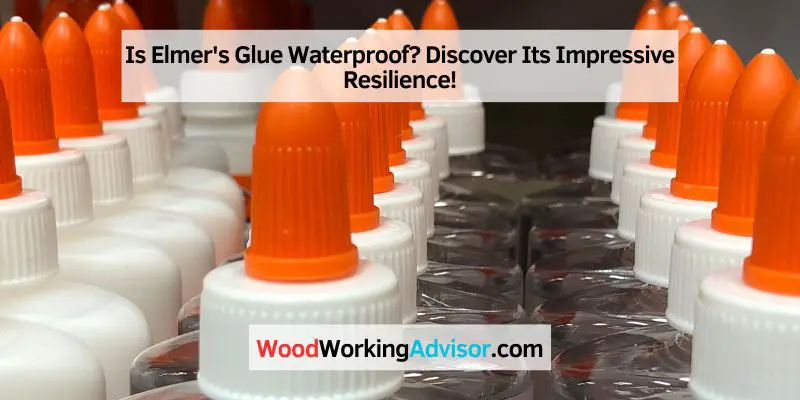Yes, Elmer’s Glue is waterproof. It creates a strong bond that can withstand exposure to water.
Elmer’s Glue is a popular adhesive used for various crafts and projects. It is known for its ability to provide a strong and durable bond. However, one common concern is whether Elmer’s Glue is waterproof. Fortunately, you can rest assured that Elmer’s Glue is indeed waterproof.
This means that once the glue dries, it is resistant to water, making it ideal for projects that may come in contact with moisture or require waterproofing properties. Whether you are working on a DIY project, repairing something, or engaging in arts and crafts activities, Elmer’s Glue is a reliable choice that can withstand exposure to water and provide a long-lasting bond.

Credit: www.amazon.com
The Composition Of Elmer’s Glue
The Composition of Elmer’s Glue:
Elmer’s Glue is a well-known brand of adhesive that has gained popularity for its versatility and reliability. Understanding the composition of Elmer’s Glue can help us determine its suitability for various applications, including its waterproof properties. Let’s delve into the key ingredients and explore how Elmer’s Glue works.
Key Ingredients:
Elmer’s Glue consists of several key ingredients that give it its unique adhesive properties:
- Polyvinyl Acetate (PVA): This is the primary ingredient in Elmer’s Glue. PVA, a synthetic polymer, forms a strong bond when it dries. It is known for its water resistance and flexibility, making it ideal for various craft and woodworking applications.
- Water: As the name suggests, Elmer’s Glue contains a significant amount of water. This helps to thin out the glue for easy application and allows it to dry transparently, making it suitable for a wide range of bonding and crafting projects.
- Other Additives: Elmer’s Glue may also contain additives such as preservatives to extend its shelf life and improve its performance. These additives help maintain the adhesive qualities of the glue over time.
How It Works:
When Elmer’s Glue is applied to a surface, the water content begins to evaporate, causing the glue to become tacky and sticky. As the glue dries, the PVA molecules start to form strong intermolecular bonds, creating a durable bond between the adhered materials. This adhesive bond is not only reliable but also offers a level of water resistance.
The PVA polymer chains work by intertwining with the surface, creating a strong bond that can withstand various stresses. While Elmer’s Glue is not entirely waterproof, it does provide a certain level of water resistance, making it suitable for projects where mild exposure to water is expected.
It’s important to note that excessive exposure to moisture or prolonged submersion in water can compromise the adhesive bond created by Elmer’s Glue. In such cases, it is advisable to opt for specialized waterproof adhesives for reliable waterproofing.
Testing Elmer’s Glue Waterproofness
When it comes to arts and crafts, one of the most commonly used adhesives is Elmer’s glue. It’s known for its versatility and reliable bonding properties. But what about its waterproofness? Can you trust Elmer’s glue to hold up against moisture? Let’s find out by subjecting it to two tests: the immersion test and the exposure test.
Immersion Test
The immersion test involves submerging the glued surface in water for a period of time to assess the glue’s resistance to moisture. To conduct this test, a sample piece of material, such as fabric or paper, is coated with Elmer’s glue and left to dry completely. Once dry, the sample is then placed in a container filled with water, ensuring it is fully immersed.
In this test, we observe how the glue reacts to prolonged exposure to water. Does it absorb the moisture, causing the bond to weaken and eventually break, or does it maintain its adhesive strength? The immersion test provides valuable insights into whether Elmer’s glue is truly waterproof.
Exposure Test
The exposure test focuses on the glue’s performance when exposed to different types of moisture, such as rain or humidity. For this test, we apply Elmer’s glue to a sample material, similar to the immersion test. However, instead of immersing it in water, we subject it to various moisture conditions.
This allows us to evaluate how well the glue resists moisture when faced with real-world scenarios. It provides a practical understanding of the glue’s waterproofness, as we simulate common situations where you might need a waterproof adhesive.
By conducting these two tests, we can determine whether Elmer’s glue lives up to its reputation as a waterproof adhesive. Stay tuned as we reveal the results of our experiments and discover just how reliable Elmer’s glue truly is when it comes to battling moisture.
Applications And Considerations
When it comes to using Elmer’s glue in various applications, it’s essential to consider its waterproof properties before diving into any project. Understanding where and how this adhesive can be used is crucial for achieving the best results. Let’s explore the various applications and considerations when using Elmer’s glue, including its suitability for craft projects and outdoor use.
Craft Projects
Elmer’s glue is a versatile adhesive that finds numerous applications in craft projects. Whether you’re working with paper, fabric, or other materials, this glue provides a strong bond, making it ideal for creating collages, scrapbooks, and other artistic endeavors. Its non-toxic formula also makes it safe for kids to use, allowing for family-friendly crafting activities.
Outdoor Use
While Elmer’s glue is not designed specifically for outdoor use, it can still be suitable for certain applications. For example, it can be used to seal and protect small craft projects from moisture or as a temporary fix for outdoor decorations. However, prolonged exposure to outdoor elements may compromise its adhesion, so it’s essential to consider the specific conditions and usage requirements when using Elmer’s glue in outdoor settings.
Comparing With Other Waterproofing Options
When it comes to waterproofing, it is important to explore your options and choose the best product for your needs. Elmer’s Glue is a popular choice for many DIY enthusiasts, but how does it stack up against other waterproofing options? Let’s take a closer look at the effectiveness and ease of use of Elmer’s Glue compared to other alternatives.
Effectiveness
When it comes to waterproofing, one of the most important factors to consider is the effectiveness of the product. Elmer’s Glue is known for its strong adhesive properties, but is it truly waterproof? Compared to other options such as silicone sealants or epoxy resin, Elmer’s Glue may not offer the same level of water resistance. While it can provide a temporary barrier against moisture, it may not be as reliable for long-term waterproofing projects.
On the other hand, silicone sealants and epoxy resin are specifically designed for waterproofing applications. These options create a strong and durable seal that can withstand exposure to water and other liquids. If you require a high level of water resistance for your project, it may be worth considering these alternatives instead of relying solely on Elmer’s Glue.
Ease Of Use
Another important aspect to consider when comparing waterproofing options is the ease of use. Elmer’s Glue is widely available and easy to find in most stores, making it a convenient choice. It can be applied with a brush or spreader, allowing for precise application. The drying time is relatively quick, which means you can move on to the next step of your project sooner.
However, silicone sealants and epoxy resin may require a bit more expertise to use effectively. These options often come in a tube or cartridge and require a caulking gun for application. The curing time can be longer, which means you may need to wait before proceeding with your project. Additionally, the cleanup process for silicone sealants and epoxy resin can be more involved compared to Elmer’s Glue.
| Elmer’s Glue | Silicone Sealants | Epoxy Resin |
|---|---|---|
| Convenient and easy to find | Requires a caulking gun for application | Longer curing time |
| Quick drying time | Creates a strong and durable seal | More involved cleanup process |
| High level of water resistance |
In conclusion, Elmer’s Glue can provide some level of waterproofing, but it may not offer the same level of effectiveness and long-term water resistance as other alternatives such as silicone sealants or epoxy resin. However, Elmer’s Glue is a convenient and easy-to-use option for smaller projects or temporary waterproofing needs. Consider your specific requirements and choose the waterproofing option that best suits your needs.
Conclusion And Practical Tips
Wondering if Elmer’s Glue is waterproof? The answer is yes, it is. When used on surfaces like paper, wood, and fabric, Elmer’s Glue provides a strong bond and is also waterproof. To ensure maximum water resistance, apply a thin, even layer and let it dry completely before exposure to water.
After considering the properties and performance of Elmer’s Glue, it is safe to conclude that Elmer’s Glue is not waterproof. This popular adhesive product is water-soluble, which means it will dissolve or become soft when it comes into contact with water. However, this does not mean that Elmer’s Glue is incapable of withstanding any moisture at all.
Recommended Uses
Elmer’s Glue is widely used for various crafting, school, and household projects, where water-resistance may not be a necessity. Some of the recommended uses of Elmer’s Glue include:
| Applications | Recommended Uses |
|---|---|
| General Crafts | Making paper collages, creating DIY decorations, and assembling models. |
| School Projects | Building dioramas, constructing science fair displays, and creating educational materials. |
| Scrapbooking | Adhering to photos, paper cutouts, and embellishments to preserve memories in a scrapbook. |
Maintenance Tips
To ensure the longevity of your projects using Elmer’s Glue, follow these maintenance tips:
- Avoid direct exposure to water: Since Elmer’s Glue is not waterproof, it is important to avoid exposing glued surfaces to water. This can prevent the glue from dissolving and compromising the adhesive bond.
- Store in a dry place: To maintain the consistency and effectiveness of Elmer’s Glue, store it in a cool, dry place. Avoid subjecting the glue to high temperatures or excessive humidity.
- Apply additional coatings: If water resistance is desired for your project, consider applying a waterproof sealant or varnish over the glued surfaces. This can provide an extra layer of protection against moisture.
- Follow the manufacturer’s instructions: Always refer to the instructions provided by Elmer’s for proper application and usage guidelines. This will ensure the best performance and durability of your projects.
By following these practical tips, you can make the most out of your projects with Elmer’s Glue and achieve long-lasting results.

Frequently Asked Questions On Is Elmer’s Glue Waterproof
Does Elmer’s Glue Come Off With Water?
Yes, Elmer’s glue can be easily removed with water.
Is Elmer Glue-all Water Soluble?
Yes, Elmer’s Glue-All is water soluble. It dissolves easily in water and can be washed away.
What Does Elmer’s Glue Not Stick To?
Elmer’s glue does not stick to surfaces such as plastic, wax paper, or silicone. It also does not work well on wet or oily surfaces.
Is Elmer’s Glue Permanent?
No, Elmer’s glue is not permanent. It is a PVA glue that dries clear and is easy to remove.
Conclusion
Elmer’s Glue is not waterproof, making it unsuitable for projects requiring water resistance. However, it offers a strong bond for various crafting and DIY purposes. By understanding its limitations, you can effectively utilize Elmer’s Glue in your projects, ensuring successful and long-lasting results.


